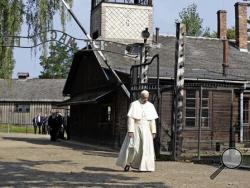OSWIECIM, Poland (AP) — Pope Francis paid a somber visit to the Nazi German death camp of Auschwitz-Birkenau Friday, becoming the third consecutive pontiff to make the pilgrimage to the place where Adolf Hitler's forces killed more than 1 million people, most of them Jews.
Francis entered the camp on foot, walking slowly beneath the notorious gate at Auschwitz bearing the cynical words "Arbeit Macht Frei."
He prayed silently for more than 15 minutes before meeting with several survivors of the camp, greeting them one by one, shaking their hands and kissing them on the cheeks. He then carried a large white candle and placed it at the Death Wall, where prisoners were executed.
At the dark underground prison cell that once housed St. Maximilian Kolbe, a Polish Catholic friar who sacrificed his own life during the war to save the life of another man, Francis prayed again.
A few shafts from a tiny window were the only light cast on the white figure of the pope, who knelt for many minutes before he crossed himself and rose to his feet.
As an Argentine he is the first pope to visit Auschwitz who did not himself live himself through the brutality of World War II on Europe's soil.
Both of his predecessors had a personal historical connection to the site, with the first, John Paul II, coming from Poland and himself a witness to the unspeakable suffering inflicted on his nation during the German occupation.
His visit in 1979 made history and was part of the Vatican's historical efforts at reconciliation with Jews. Pope Benedict XVI, who visited in 2006, was a German who served in the Hitler Youth for a time as a teenager.
As a pope hailing from afar, Francis's visit helps to underline the universal importance of a site that in recent years has drawn ever more visitors from around the world.
Francis' visit is also different in its private character, with no speeches planned. It marks a difference from the visit by Benedict, who spoke in Italian — avoiding his native German language — in a speech he which he questioned why God was silent at the slaughter of so many.
Vatican and Polish church officials had explained that Francis wanted to express his sorrow in silence at the site, mourning the victims in quiet prayer and meditation.
Francis had been scheduled to fly from Krakow to Oswiecim, the small town where the former death camp is located, but due to bad weather traveled the 65 kilometers (40 miles) by car instead.
It is his third day of a five-day visit to Poland that includes meetings with young pilgrims taking part in World Youth Day, a global youth celebration.
Friday is devoted to the theme of suffering. Later in the day Francis will visit a children's hospital in Krakow and take part in a Way of the Cross with the young people.
___
Monika Scislowska in Krakow and Vanessa Gera in Warsaw contributed to this report.

